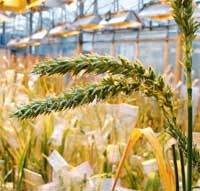Feeding world closer as boffins crack wheat gene code

Crop traits vital for future food production could soon be within the grasp of plant breeders after scientists unravelled the genetic sequence of the wheat plant.
Researchers hope that the breakthrough will accelerate research into traits such as drought resistance, salt tolerance and higher yields.
That could help feed a growing world population and improve UK farmers’ competitiveness, a spokesman for the Biotechnology and Biological Sciences Research Council told Farmers Weekly.
The information was publicly released on Friday 27 August by the BBSRC which funded the research.
One of the team involved in the work, Keith Edwards of the University of Bristol, explained the difficulties of unravelling the genetic make-up of wheat.
“The wheat genome is five times larger than the human genome and presents a huge challenge for scientists,” said Professor Edwards.
“The genome sequences are an important tool for researchers and for plant breeders and by making the data publicly available we are ensuring this research has the widest possible impact.”
BBSRC chief executive Doug Kell added: “Recent short-term price spikes in the wheat markets have shown how vulnerable our food system is to shocks and potential shortages.
“The best way to support our food security is by using modern research strategies to understand how we can deliver sustainable increases in crop yields, especially in the face of climate change.
“Genome sequencing of this type is an absolutely crucial strategy, building on previous BBSRC-funded work.
“Knowledge of these genome sequences will now allow plant breeders to identify the best genetic sequences to use as markers in accelerated breeding programmes,” Prof Kell said.

